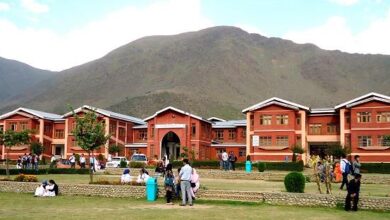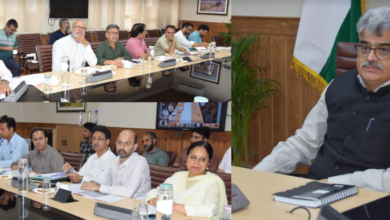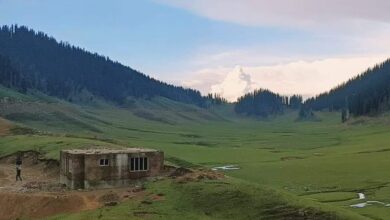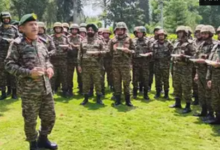Deputy Chairman of the Rajya Sabha, Harivansh Praised Keshav Bharadwaj’s Bhojpuri Story Collection ‘Redlight’
Deputy Chairman of the Rajya Sabha, Harivansh Narayan Singh, has praised Keshav Bharadwajs Bhojpuri story collection Redlight as a credible depiction of human suffering in British colonial countries. He expressed his happiness with the storytelling in Bhojpuri. This story collection is garnering strong support from Bhojpuri and Hindi-speaking audiences on online platforms. The number of Bhojpuri speakers worldwide exceeds 200 million, with over 60 million in India alone. It is hoped that this story collection will achieve new levels of popularity among Bhojpuri and Hindi-speaking audiences worldwide.
Keshav Bharadwaj presenting his book to the Deputy Chairman of the Rajya Sabha, Shri Harivansh Narayan Singh
Redlight serves as a historical testament to human tragedy. The author has spread all the colours of human existence in this short but poignant story. The main character of the story sees ‘Mulago Hospital’ at Kampala’s famous jam-packed red light as a place of faith, sacrifice, and dedication towards the freedom fighters.
The hero of the story, who has received police training, keeps turning his attention to the inconsistencies in the African society, far away from India, while simultaneously connecting it with the values and culture of Indian society. He also gets excited after finding the company of non-resident Indians and the ancient Ganesh temple near his residence. He also sees the beautiful blend of tradition and modernity, dazzling nightclubs, and people dying from malaria that has been otherwise eradicated. The heros favourite subject is the exploration of the universal social elements of India and Uganda. The story also introduces us to the powerful campaign of Burmas famous Prime Minister U Shaw against British rule during the Second World War and the poignant story of his being made a prisoner of war.
In the middle of the story, the heros daily stop at the traffic red light to watch the hustle and bustle of the local goods market set up at the crossroads, just like in India, becomes his favourite way of life. While the enjoyment of the youthful appearance of the attractive young woman from Kampala, burdened by the basket of juicy mangoes at the red light, reflects the innate desire of the male element, the inquiring about her health and the regret over the habit of haggling over the price of the basket of mangoes is the manifestation of the noblest form of human values.
Through his story, Keshav made Mulago Hospital a subject of historical importance which became a metaphor in world fiction. This hospital is like the famous cemetery of Paris, filled with the graves of world-famous thinkers, philosophers, and agitators along with the dictators of the French Revolution. During the Second World War, forty-seven prisoners of war brought from Malta by the British oppressive power were kept in Bambo Barracks in Uganda, where they fell victim to malaria and ultimately sacrificed their lives at Mulago Hospital. The ‘Red Light’ story, through the medium of the hospital, forces people from India to Africa to remember the sacrifices of their ancestors who were freedom fighters and have a sense of devotion towards them.
Apart from this, in the story Golki Frame Ke Chashma, all the old things of Bettiah city revolve like a cinema reel. The reason behind the establishment of Maharani Janaki Kunwar College has been depicted wonderfully. George Orwell, Prakash Jha, and Manoj Bajpayee have also been depicted in the same story in a flow of emotions. Even now the people of that city are not aware of this. While reading it, it felt as if the literature of an established author was being read. Faisla and Khilona are beautifully woven together depicting womens power.
There is a frank and unmatched description of Prayag in Kalpavas. Every person who belongs to that era must read this book. He will definitely consider himself a character in this book. Every story in this book is good, and lively, about me-you-village-home- city. Such non-fiction prose has been written in Bhojpuri after a long time.










